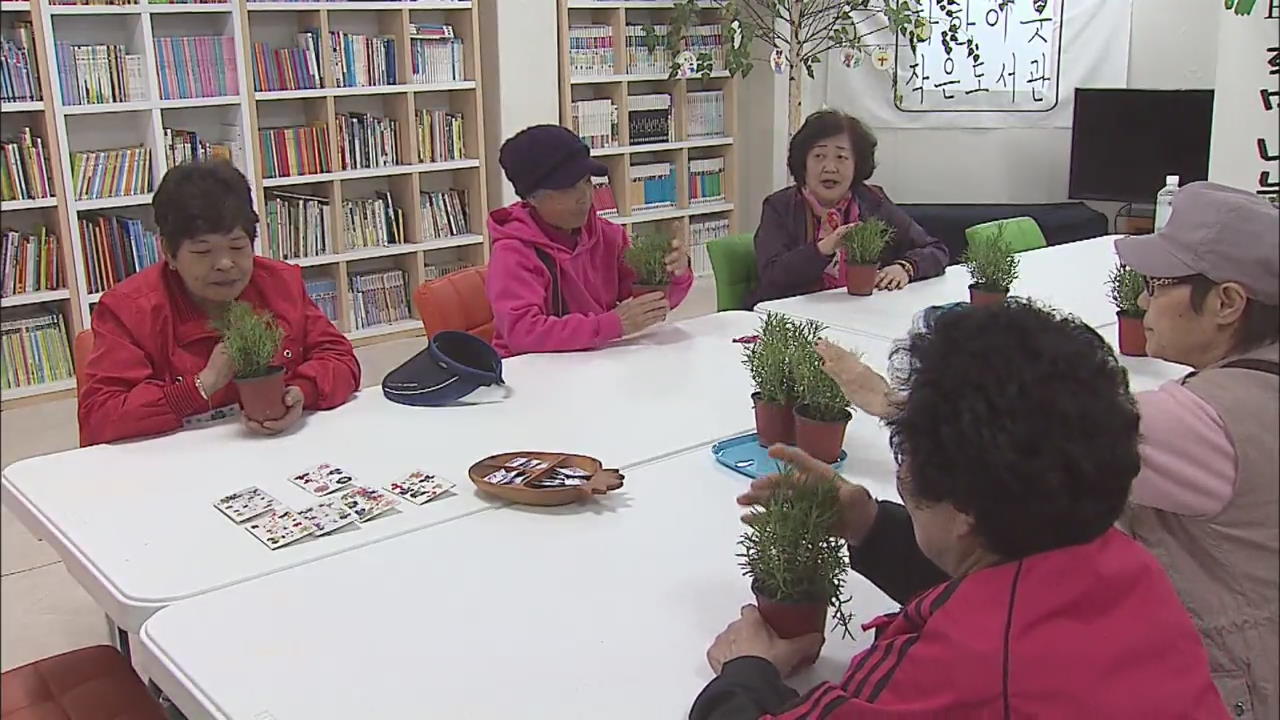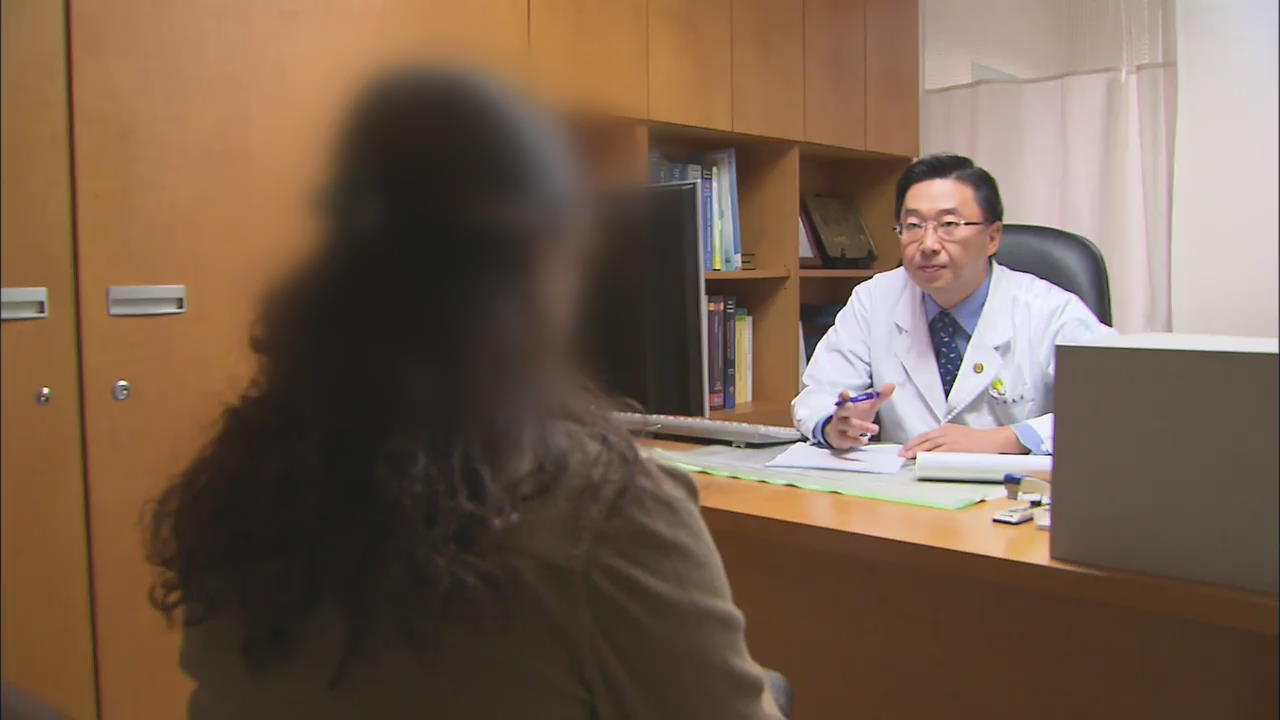Gardening & Dementia
입력 2017.04.13 (14:13)
수정 2017.04.13 (14:25)
읽어주기 기능은 크롬기반의
브라우저에서만 사용하실 수 있습니다.
[Anchor Lead]
A study says that horticulture helps dementia patients recover and rehabilitate themselves because of the sense of accomplishment and higher self-esteem that people feel when taking care of plants. Let’s check it out.
[Pkg]
People suffering from dementia sit at a round table laid with plants. They make hand sanitizers using rosemary. After observing and touching rosemary and smelling its scent, the patients begin to feel calmer.
[Soundbite] Lee Sang-nam(Patient with Early-stage Dementia) : "Being here helps me to forget about everything else and focus on the present moment. It's very good for my health."
A study conducted by a domestic university on the effects of horticultural therapy showed that it helped reduce depression severity in dementia patients from 11.5 points to 8.3 points on average. Tests on the patients' cognitive skills also showed improvement in six out of nine categories. This means that taking care of plants helps dementia patients improve concentration and gain confidence in their day-to-day responsibilities and interpersonal skills.
[Soundbite] Prof. Lee Sook(Dankook University) : "The biggest advantage of this therapy is that it enables patients to reminisce about their past and stimulate their senses by touching live plants."
The number of clinics and welfare centers that provide horticultural therapy to dementia patients has grown to 14 nationwide.
A study says that horticulture helps dementia patients recover and rehabilitate themselves because of the sense of accomplishment and higher self-esteem that people feel when taking care of plants. Let’s check it out.
[Pkg]
People suffering from dementia sit at a round table laid with plants. They make hand sanitizers using rosemary. After observing and touching rosemary and smelling its scent, the patients begin to feel calmer.
[Soundbite] Lee Sang-nam(Patient with Early-stage Dementia) : "Being here helps me to forget about everything else and focus on the present moment. It's very good for my health."
A study conducted by a domestic university on the effects of horticultural therapy showed that it helped reduce depression severity in dementia patients from 11.5 points to 8.3 points on average. Tests on the patients' cognitive skills also showed improvement in six out of nine categories. This means that taking care of plants helps dementia patients improve concentration and gain confidence in their day-to-day responsibilities and interpersonal skills.
[Soundbite] Prof. Lee Sook(Dankook University) : "The biggest advantage of this therapy is that it enables patients to reminisce about their past and stimulate their senses by touching live plants."
The number of clinics and welfare centers that provide horticultural therapy to dementia patients has grown to 14 nationwide.
■ 제보하기
▷ 카카오톡 : 'KBS제보' 검색, 채널 추가
▷ 전화 : 02-781-1234, 4444
▷ 이메일 : kbs1234@kbs.co.kr
▷ 유튜브, 네이버, 카카오에서도 KBS뉴스를 구독해주세요!
- Gardening & Dementia
-
- 입력 2017-04-13 14:08:41
- 수정2017-04-13 14:25:44

[Anchor Lead]
A study says that horticulture helps dementia patients recover and rehabilitate themselves because of the sense of accomplishment and higher self-esteem that people feel when taking care of plants. Let’s check it out.
[Pkg]
People suffering from dementia sit at a round table laid with plants. They make hand sanitizers using rosemary. After observing and touching rosemary and smelling its scent, the patients begin to feel calmer.
[Soundbite] Lee Sang-nam(Patient with Early-stage Dementia) : "Being here helps me to forget about everything else and focus on the present moment. It's very good for my health."
A study conducted by a domestic university on the effects of horticultural therapy showed that it helped reduce depression severity in dementia patients from 11.5 points to 8.3 points on average. Tests on the patients' cognitive skills also showed improvement in six out of nine categories. This means that taking care of plants helps dementia patients improve concentration and gain confidence in their day-to-day responsibilities and interpersonal skills.
[Soundbite] Prof. Lee Sook(Dankook University) : "The biggest advantage of this therapy is that it enables patients to reminisce about their past and stimulate their senses by touching live plants."
The number of clinics and welfare centers that provide horticultural therapy to dementia patients has grown to 14 nationwide.
A study says that horticulture helps dementia patients recover and rehabilitate themselves because of the sense of accomplishment and higher self-esteem that people feel when taking care of plants. Let’s check it out.
[Pkg]
People suffering from dementia sit at a round table laid with plants. They make hand sanitizers using rosemary. After observing and touching rosemary and smelling its scent, the patients begin to feel calmer.
[Soundbite] Lee Sang-nam(Patient with Early-stage Dementia) : "Being here helps me to forget about everything else and focus on the present moment. It's very good for my health."
A study conducted by a domestic university on the effects of horticultural therapy showed that it helped reduce depression severity in dementia patients from 11.5 points to 8.3 points on average. Tests on the patients' cognitive skills also showed improvement in six out of nine categories. This means that taking care of plants helps dementia patients improve concentration and gain confidence in their day-to-day responsibilities and interpersonal skills.
[Soundbite] Prof. Lee Sook(Dankook University) : "The biggest advantage of this therapy is that it enables patients to reminisce about their past and stimulate their senses by touching live plants."
The number of clinics and welfare centers that provide horticultural therapy to dementia patients has grown to 14 nationwide.
이 기사가 좋으셨다면
-
좋아요
0
-
응원해요
0
-
후속 원해요
0

















이 기사에 대한 의견을 남겨주세요.